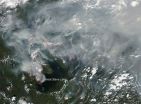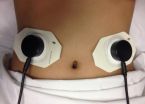(Press-News.org) Astronauts suffer considerable sleep deficiency in the weeks leading up to and during spaceflight, according to the most extensive study of sleep during spaceflight ever conducted, published in The Lancet Neurology journal.
Fatigue and sleep deficiency are common complaints among astronauts, but this is the most comprehensive study to include both objective evaluation of sleep (via an actigraph, a device worn on the wrist which records sleep and wake cycles) and subjective evaluations (via a daily diary recording alertness and sleep quality).
Researchers from Brigham and Women's Hospital, Harvard Medical School, Boston, USA, and the University of Colorado, Boulder, USA, studied the sleep patterns of 64 astronauts on 80 Shuttle missions and 21 astronauts aboard International Space Station (ISS) missions before, during, and after spaceflight. In total, they recorded more than 4000 nights of sleep on Earth and more than 4200 in space.
Despite NASA scheduling 8•5 hours of sleep per night for crew members in spaceflight, the average (mean) duration of sleep during spaceflight was just under six (5•96) hours on shuttle missions and just over six hours (6•09) on ISS missions. 12% of sleep episodes on shuttle missions and 24% on ISS missions lasted 7 hours or more, as compared with 42% and 50%, respectively, in a post-flight data collection interval when most astronauts slept at home.
Moreover, the results suggest that astronauts' build-up of sleep deficiency began long before launch, as they averaged less than 6•5 hours sleep per night during training (recorded approximately 3 months prior to spaceflight.) This is about half an hour less per night than the average American adult.
According to Dr Laura K. Barger from Brigham and Women's Hospital, Harvard Medical School, Boston, USA, "Sleep deficiency is pervasive among crewmembers. It's clear that more effective measures are needed to promote adequate sleep in crew members, both during training and spaceflight, as sleep deficiency has been associated with performance decrements in numerous laboratory and field-based studies."*
The research also highlights widespread use of sleeping medication such as zolpidem and zaleplon during spaceflight. Sleep medication use was reported by three quarters of ISS crewmembers at some point during their time on the space station, and by more than three quarters (78%) of shuttle-mission crew members. Sleep medication was used on more than half (52%) of nights in shuttle missions.
"The ability for a crewmember to optimally perform if awakened from sleep by an emergency alarm may be jeopardized by the use of sleep-promoting pharmaceuticals," says Dr Barger. "Routine use of such medications by crewmembers operating spacecraft are of particular concern, given the FDA warning that patients using sleeping pills should be cautioned against engaging in hazardous occupations requiring complete mental alertness or motor coordination, including potential impairment of the performance of such activities that may occur the day following ingestion of sedative/hypnotics. This consideration is especially important because all crewmembers on a given mission may be under the influence of a sleep-promoting medication at the same time. In fact, on the four shuttle missions on which all crewmembers participated, all crewmembers reported taking sleep-medications on the same night 6% of the time."
The spaceflight environment, where the sun rises and sets every 90 minutes, is particularly harsh for sleep. Apollo astronauts cited light, noise, and the cooling systems in spacesuits as contributing factors to their poor sleep. However, sleep disturbances continue to occur in modern spaceflight despite quiet and dark 'sleep stations' installed on the ISS, leading some scientists to speculate that microgravity itself may be to blame.
Co-author Dr Charles Czeisler of Brigham and Women's Hospital added, "Future exploration spaceflight missions to the moon, Mars, or beyond will require more effective countermeasures to optimise human performance by promoting sleep during spaceflight. These may include modifications to schedules, strategically timed exposure to specific wavelengths of light, and behavioural strategies to ensure adequate sleep, which is essential for maintaining health, performance and safety."*
Writing in a linked comment, Dr Mathias Basner from the University of Pennsylvania, USA, points out the need for further research on the effects of space on sleep. "Only four people have consecutively lived and worked for more than 1 year in space; as such, how sleep and behavioural health will be affected during space exploration is poorly understood. Studies of the physiology of sleep stages and the intensity of sleep…in space are necessary to answer the important question of whether spaceflight reduces the need for sleep and therefore the ability to sleep, or whether it reduces the ability to sleep but not the need for sleep."
INFORMATION:
This study was funded by NASA and the National Space Biomedical Research Institute (NSBRI).
The Lancet Neurology: study highlights pervasive problem of sleep deprivation in astronauts
2014-08-08
ELSE PRESS RELEASES FROM THIS DATE:
Air traffic growth set to outpace carbon reduction efforts
2014-08-08
Carbon reduction efforts in the airline industry will be outweighed by growth in air-traffic, even if the most contentious mitigation measures are implemented, according to new research by the University of Southampton.
Even if proposed mitigation measures are agreed upon and put into place, air traffic growth-rates are likely to out-pace emission reductions, unless demand is substantially reduced.
"There is little doubt that increasing demand for air travel will continue for the foreseeable future," says co-author and travel expert Professor John Preston. "As a result, ...
Ten-year study highlights sleep deficiency and sleep medication use in astronauts
2014-08-08
BOSTON, MA – In an extensive study of sleep monitoring and sleeping pill use in astronauts, researchers from Brigham and Women's Hospital (BWH) Division of Sleep and Circadian Disorders, Harvard Medical School, and the University of Colorado found that astronauts suffer considerable sleep deficiency in the weeks leading up to and during space flight. The research also highlights widespread use of sleeping medication use among astronauts.
The study, published in The Lancet Neurology on August 8, 2014, recorded more than 4,000 nights of sleep on Earth, and more than ...
New test predicts individual's risk of a second kidney stone
2014-08-08
Washington, DC (August 7, 2014) — A new tool that takes multiple factors into account can accurately predict how likely a patient who experienced a painful kidney stone will develop another one in the future. The tool, which is described in an upcoming issue of the Journal of the American Society of Nephrology (JASN), could help patients and their doctors determine whether preventive measures are needed.
Kidney stones are common and affect approximately 6% to 9% of the population. The greatest concern of patients who have experienced a kidney stone is whether this excruciating ...
Boston Marathon bombing caregivers still grappling with tragedy one year later
2014-08-08
Boston, MA (August, 2014) – Nearly a year after the 2013 Boston Marathon bombings, hospital staff, first responders and medical volunteers who cared for the injured and dying were still struggling to put the experience behind them, according to a Schwartz Center for Compassionate Healthcare report that describes eight confidential sessions held to help caregivers process their emotions and feelings in the aftermath of this horrific event.
The 90-minute Schwartz Center Rounds sessions – sponsored by the Schwartz Center in collaboration with the Conference of Boston Teaching ...
Slowing brain functions linked to increased risk of stroke, death
2014-08-07
Cognitive abilities such as memory and attention are not only important after a stroke but also before; according to research published in the American Heart Association journal Stroke.
Previous studies have shown poor cardiovascular health can increase the risk of cognitive impairment such as problems in memory and learning. However, the opposite idea that cognitive impairment may impact cardiovascular health, specifically stroke, was not established before.
"Most clinical studies observe cognitive impairment after a stroke event, said Kumar Rajan, Ph.D., lead author ...
Neck manipulation may be associated with stroke
2014-08-07
Treatments involving neck manipulation may be associated with stroke, though it cannot be said with certainty that neck manipulation causes strokes, according to a new scientific statement published in the American Heart Association's journal Stroke.
Cervical artery dissection (CD) is a small tear in the layers of artery walls in the neck. It can result in ischemic stroke if a blood clot forms after a trivial or major trauma in the neck and later causes blockage of a blood vessel in the brain. Cervical artery dissection is an important cause of stroke in young and middle-aged ...
New treatment successful for the Mal de Debarquement Syndrome
2014-08-07
People who suffer from a rare illness, the Mal de Debarquement Syndrome (MdDS), now have a chance for full recovery thanks to treatment developed by researchers at the Icahn School of Medicine at Mount Sinai. Their findings were published online in the July issue of Frontiers in Neurology.
People often feel a sensation of movement, called Mal de Debarquement, after they have finished boating, surfing or a sea voyage. The symptoms usually disappear within hours, but in some people, and more frequently in women, symptoms can continue for months or years, causing fatigue, ...
Northwest Territories on fire and smoke drifts over Labrador Sea
2014-08-07
The fires on the shores of the Great Slave Lake in the Northwest Territories in Canada do not seem in any hurry to be extinguished. In this natural-color satellite image which was collected by the Moderate Resolution Imaging Spectroradiometer (MODIS) aboard the Aqua satellite on July 29, 2014 dozens of fires and copious amounts of smoke are evident. Actively burning areas, detected by MODIS's thermal bands, are outlined in red.
Click on the image above and an image of smoke drifting over the Labrador Sea appears. This smoke has risen off the fires in the Northwest Territories ...
Laparoscopic surgical removal of the gallbladder in pediatric patients is safe
2014-08-07
ROCHESTER, Minn. — A recent study conducted by Mayo Clinic researchers recommends laparoscopic cholecystectomies (surgical removal of the gallbladder) for pediatric patients suffering from gallstones and other gallbladder diseases. This study was published in Surgical Laparoscopy Endoscopy & Percutaneous Techniques.
MULTIMEDIA ALERT: Video and audio are available for download on the Mayo Clinic News Network.
A cholecystectomy is a surgical procedure performed to remove the gallbladder, a pear-shaped organ located below the liver on the upper right side of the abdomen. ...
New disposable biosensor may help physicians determine which patients can safely be fed following surgery
2014-08-07
A disposal, plastic listening device that attaches to the abdomen may help doctors definitively determine which post-operative patients should be fed and which should not, an invention that may improve outcomes, decrease healthcare costs and shorten hospital stays, according to a UCLA study.
Some patients who undergo surgery develop a condition called post-operative ileus (POI), a malfunction of the intestines. The condition causes patients to become ill if they eat too soon, which can lengthen an affected patient's hospital stay by two to three days. Until now, there ...

